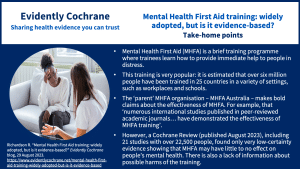Mental Health First Aid (MHFA) training – where trainees learn how to provide immediate help to people in distress – has been widely adopted in a variety of settings, such as schools and workplaces. There are bold claims that it is effective. However, a recent Cochrane Review challenges those claims, finding very low-certainty evidence that MHFA may have little to no effect on people’s mental health. Rachel Richardson, one of the review authors, explains.
Take-home points
Mental Health First Aid (MHFA) training: what is it?
MHFA training originated in Australia in 2000 as a brief training programme to improve mental health literacy and teach mental health first aid strategies. Accredited MHFA instructors deliver training designed to increase knowledge about mental health problems and decrease the stigma often attached to these. The trainees learn how to provide immediate help to people in distress and how to signpost to services.
Is Mental Health First Aid (MHFA) training widespread?
It is certainly popular: MHFA Australia estimates that over six million people worldwide have been trained, and that over 25 countries have now adopted MHFA training.
It is easy to see why so many organisations have adopted MHFA. Many people experience mental health problems which can be devastating on a personal level, and these can also lead to absences from work. Organisations may want to do something practical to help, and an evidence-based training course seems like a great solution. The course will also be appealing to people who want to know how they help when someone is experiencing mental health problems.
Bold claims of effectiveness
The Mental Health First Aid Australia website makes bold claims about the research evidence behind Mental Health First Aid training. The training courses are “grounded in evidence-based research” and “numerous international studies published in peer-reviewed academic journals… have demonstrated the effectiveness of Mental Health First Aid (MHFA™) training”. These are seductive statements and, as a research scientist, I wanted to find out more. What does the research look like and what does it prove?
Does Mental Health First Aid (MHFA) training really improve mental health?
I decided that what I really wanted to know was whether MHFA training improves mental health. In other words, if an organisation (for example, a school) adopts MHFA, will there be improvements in the mental health of students and teachers? I was also interested in any ‘adverse effects’ (harms). It is not difficult to imagine that there might be disadvantages to MHFA. What if a mental health first-aider signposted to services not readily available to help the person in distress? Would first-aiders ‘take on’ too much – would they feel overly responsible for helping a person when the situation was very complex?
I was less interested in whether MHFA training improved mental health literacy, that is, increasing knowledge about mental health problems and decreasing stigma. Although these are important, I felt they were secondary to the main goal of the programme: to improve mental health.
How does the evidence stack up?
With my fellow authors, I searched the medical literature, looking for randomised controlled trials (RCTs) that would answer my questions. We focused on RCTs as these represent the most reliable evidence for deciding whether an intervention works. We selected relevant RCTs and examined their findings. Another important part of our research was to make judgements about whether the way that the studies were designed or carried out made their findings less reliable.
We were encouraged by the number of studies we found: 21 studies including over 22,500 people that were relevant to our questions. Researchers worldwide had trialled MHFA in all sorts of settings, including schools, workplaces, and colleges. There was a large variety of people in the studies, including student nurses, local government officials, schoolteachers, and military personnel.
We focused on how effective MHFA training was when compared to having no training. Disappointingly we only found five studies that had actually measured whether MHFA training improved mental health. It was also disappointing to find that there were multiple problems in the way that the research had been carried out, which means that the evidence is less reliable. Another problem was that the number of people in the studies which did provide this information were too small to enable us to reach definitive conclusions.
Our overall finding was that MHFA may result in little to no difference in the mental health of people in organisations that have adopted this training, but we had very little confidence in this result due to the problems with the evidence. We also found that there were no systematically collected data on whether there are adverse effects associated with the training.
What are the implications of our findings?
It is striking that a training programme that has been so widely adopted is not better supported by solid evidence that it is effective in improving mental health. This seems to me to be the key test of how well it works. It is also concerning that there is no reliable evidence about whether it causes harm. At face value, MHFA sounds like a good idea. However, there are many examples of interventions that seemed like good ideas but have since been proven to be ineffective, or even to cause harm.
People considering adopting MHFA in their organisations should look at the evidence before making their decision. I also advise researchers to focus on the outcomes that matter, namely mental health outcomes, rather than whether training improves knowledge in Mental Health First Aiders. They should also minimise possible biases when carrying out research and involve enough people to be able to reach definitive conclusions.
The Cochrane Review:
Richardson R, Dale HE, Robertson L, Meader N, Wellby G, McMillan D, Churchill R. Mental Health First Aid as a tool for improving mental health and well‐being. Cochrane Database of Systematic Reviews 2023, Issue 8. Art. No.: CD013127. DOI: 10.1002/14651858.CD013127.pub2.
Declaration of interest: Rachel is currently employed by Cochrane as the Methods Support Unit manager and previously worked as an Assistant Editor.
You can join in the conversation on Twitter with @CochraneUK @racherichardson or leave a comment on the blog.
Please note, we cannot give specific medical advice and do not publish comments that link to individual pages requesting donations or to commercial sites, or appear to endorse commercial products. We welcome diverse views and encourage discussion but we ask that comments are respectful and reserve the right to not publish any we consider offensive. Cochrane UK does not fact-check – or endorse – readers’ comments, including any treatments mentioned.




Hey Rachel, good day and I trust this finds you well.
I came across your article while researching figures for help seeking behaviour in the mental health space and there are a few things that I’m struggling to come to terms with in your piece.
The main question asked strongly suggests that MHFA Aus claim their training improves people’s mental health outcomes, with follow-up comments that:
a. “Disappointingly we only found five studies that had actually measured whether MHFA training improved mental health”; and
b. “Our overall finding was that MHFA may result in little to no difference in the mental health of people in organisations that have adopted this training, but we had very little confidence in this result due to the problems with the evidence.”
What I am most puzzled by however, is the comment that, “I was less interested in whether MHFA training improved mental health literacy, that is, increasing knowledge about mental health problems and decreasing stigma. Although these are important, I felt they were secondary to the main goal of the programme: to improve mental health.”
I’m very interested in the efficacy of MHFA myself, particularly whether it is effective in improving MH literacy as the ADF courses, which I undertook a number of during my career.
But having completed the MHFA Provider and the Instructor course (I have only facilitated the training as part of my Defence-paid work, so I have no vested interest in negative press), and having scanned the MHFA website, I have never heard, seen, or been told that anyone within the organisation claims that MHFA improves people’s mental health. That is like claiming that carrying out CPR as a physical First Aider improves cardiological outcomes; absolute nonsense – but it might very well keep someone alive to ensure they are placed under the care of a Cardiologist for proper treatment.
THAT is the very reason why MHFA exists and where it has most value; so I am turbo-surprised that it is the one question in which you state that you are not interested.
Further, there is plenty of evidence where intervention by physical First Aiders has had negative outcomes too, but they are not professionals and that is why we have The Good Samaritan law. Better to try than to walk by.
I’m more than happy for you to point me in the direction of the claims of ‘improving people’s mental health’ as the only way I can see that being so, besides what I’ve already said about referring, is that I myself have lived experience of a mental health collapse and (almost) recovery and part of my improvement was understanding why what happened happened and why I it was so hard to escape the lack of efficacy. Personally, that knowledge helped my recovery immensely, so if you want to carry out further research, I’m happy to be in your cohort.
Admittedly, I also had also gained most of this info through my various therapies, but I still see the value of the training for anyone who has been lucky enough not to suffer mental health issues.
This training informs what I do with veterans in my volunteer role in Parabiathlon so, as I said, please do point me in the direction where these claims are published, because if that is happening I want to report it to MHFA Australia and have it removed.
Warm regards,
Curtis Steiger
Veterans & Emergency Services Parabiathlon Australia
Posted on behalf of Rachel Richardson:
Thanks, Curtis, for taking the time to submit a comment on the blog. Your main feedback seems to be that I am suggesting that MHFA Australia claim that their training improves mental health. I don’t think that I do suggest this, but I do emphasize that the organisation states that the training courses are ‘grounded in evidence-based research’.
We chose our main research question carefully. We believe that people or organisations who might choose to adopt MHFA training should be aware of the evidence regarding important outcomes, and one of these is whether the intervention can improve people’s mental health or well-being.
We do examine the evidence on whether MHFA training has an impact on mental health literacy and on reducing stigma. Our findings can be seen in the full version of our review on the Cochrane Library: https://www.cochranelibrary.com/cdsr/doi/10.1002/14651858.CD013127.pub2/full